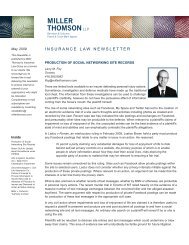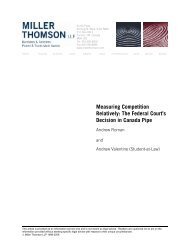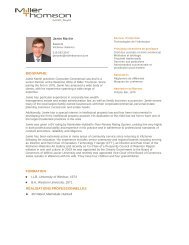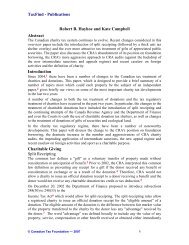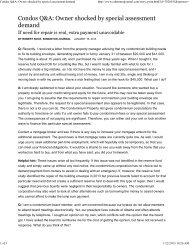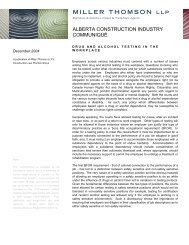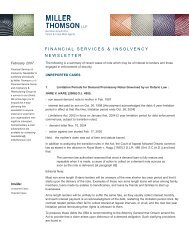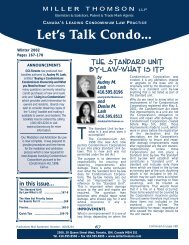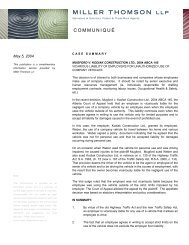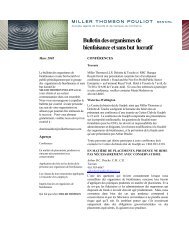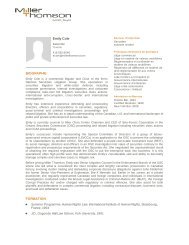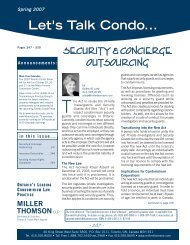"Consent and the Personal Health information ... - Miller Thomson
"Consent and the Personal Health information ... - Miller Thomson
"Consent and the Personal Health information ... - Miller Thomson
Create successful ePaper yourself
Turn your PDF publications into a flip-book with our unique Google optimized e-Paper software.
–18 –<br />
that “<strong>the</strong> rationale for not incorporating stricter access controls into clinical <strong>information</strong> systems<br />
that are typically used in hospitals is that if relevant <strong>information</strong> is not readily available in an<br />
emergency situation, this could pose a risk to a patient’s health <strong>and</strong> safety.” 78<br />
Having said this, <strong>the</strong>se types of mechanisms must be used in conjunction with appropriate<br />
policies <strong>and</strong> procedures, including a privacy breach protocol that coordinates <strong>the</strong> privacy <strong>and</strong><br />
human resources components of <strong>the</strong> investigation. The IPC stated that while human resources<br />
protocols are important, patient privacy is <strong>the</strong> paramount consideration. 79<br />
Collecting, Using, <strong>and</strong> Disclosing <strong>Personal</strong> <strong>Health</strong> Information without <strong>Consent</strong><br />
As stated above, <strong>the</strong> general principle under PHIPA provides that PHI may only be collected,<br />
used or disclosed with <strong>the</strong> consent of <strong>the</strong> individual, or as permitted or required under <strong>the</strong> Act.<br />
PHIPA was not intended to replace all existing legislation with respect to <strong>the</strong> use <strong>and</strong> disclosure<br />
of PHI, <strong>and</strong> for <strong>the</strong> most part, preserves, updates <strong>and</strong> broadens <strong>the</strong> application of such provisions<br />
so that <strong>the</strong>y are applied consistently within <strong>the</strong> health sector. Fur<strong>the</strong>rmore, <strong>the</strong> legislation<br />
recognizes that <strong>the</strong>re are situations where obtaining consent for <strong>the</strong> collection, use or disclosure<br />
of PHI may not be possible or appropriate <strong>and</strong> it adopts special provisions, where, for public<br />
policy reasons, such activities do not require consent.<br />
Where a provision allowing disclosure under PHIPA is permissive, a HIC is not required to<br />
disclose <strong>the</strong> PHI unless required to do so by law; nor is <strong>the</strong> HIC relieved from a legal<br />
requirement to disclose <strong>the</strong> <strong>information</strong>. 80 Finally, it does not prevent <strong>the</strong> HIC from obtaining<br />
<strong>the</strong> individual's consent for <strong>the</strong> disclosure 81 <strong>and</strong> <strong>the</strong>re are many reasons why a custodian, for<br />
policy reasons may set its own internal rules with respect to different types of PHI. For example,<br />
a psychiatric facility may develop more stringent requirements for disclosure of sensitive PHI<br />
than required under <strong>the</strong> Act.<br />
Permissible Forms of Indirect Information Collection without <strong>Consent</strong><br />
PHIPA sets out those circumstances where a HIC may collect <strong>information</strong> about an individual<br />
from a source o<strong>the</strong>r than <strong>the</strong> person to whom <strong>the</strong> <strong>information</strong> relates. For example, indirect<br />
collection of PHI without consent is permitted if such <strong>information</strong> is reasonably necessary for <strong>the</strong><br />
provision of health care, <strong>and</strong> it is not reasonably possible to collect PHI <strong>the</strong> <strong>information</strong> directly<br />
from <strong>the</strong> patient. 82 This may be because <strong>the</strong> <strong>information</strong> cannot be relied on as accurate, 83 for<br />
example, where <strong>the</strong> individual is disoriented or confused or suffering from a mental disorder<br />
which affects his or her perception. Secondly, a HIC may need to collect <strong>information</strong> from o<strong>the</strong>r<br />
sources where <strong>the</strong> <strong>information</strong> cannot be obtained directly from <strong>the</strong> individual “in a timely<br />
78 Ibid. at 14<br />
79 Ibid. at 15<br />
80 PHIPA, ss. 6(3)(a) <strong>and</strong> (b)<br />
81 PHIPA, s. 6(3)(c)<br />
82 PHIPA, s. 36(1)(b)<br />
83 PHIPA, s. 36(1)(b)(i)




